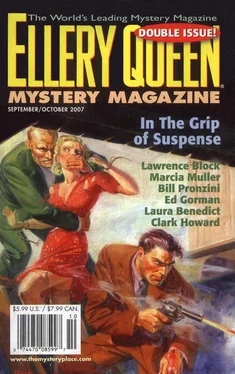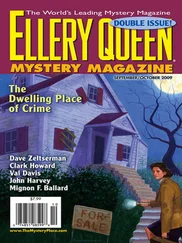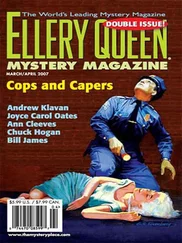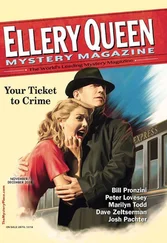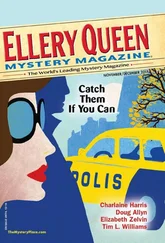Donna Andrews - Ellery Queen’s Mystery Magazine. Vol. 130, No. 3 & 4. Whole No. 793 & 794, September/October 2007
Здесь есть возможность читать онлайн «Donna Andrews - Ellery Queen’s Mystery Magazine. Vol. 130, No. 3 & 4. Whole No. 793 & 794, September/October 2007» весь текст электронной книги совершенно бесплатно (целиком полную версию без сокращений). В некоторых случаях можно слушать аудио, скачать через торрент в формате fb2 и присутствует краткое содержание. Город: New York, Год выпуска: 2007, ISBN: 2007, Издательство: Dell Magazines, Жанр: Детектив, на английском языке. Описание произведения, (предисловие) а так же отзывы посетителей доступны на портале библиотеки ЛибКат.
- Название:Ellery Queen’s Mystery Magazine. Vol. 130, No. 3 & 4. Whole No. 793 & 794, September/October 2007
- Автор:
- Издательство:Dell Magazines
- Жанр:
- Год:2007
- Город:New York
- ISBN:ISSN 0013-6328
- Рейтинг книги:4 / 5. Голосов: 1
-
Избранное:Добавить в избранное
- Отзывы:
-
Ваша оценка:
- 80
- 1
- 2
- 3
- 4
- 5
Ellery Queen’s Mystery Magazine. Vol. 130, No. 3 & 4. Whole No. 793 & 794, September/October 2007: краткое содержание, описание и аннотация
Предлагаем к чтению аннотацию, описание, краткое содержание или предисловие (зависит от того, что написал сам автор книги «Ellery Queen’s Mystery Magazine. Vol. 130, No. 3 & 4. Whole No. 793 & 794, September/October 2007»). Если вы не нашли необходимую информацию о книге — напишите в комментариях, мы постараемся отыскать её.
Ellery Queen’s Mystery Magazine. Vol. 130, No. 3 & 4. Whole No. 793 & 794, September/October 2007 — читать онлайн бесплатно полную книгу (весь текст) целиком
Ниже представлен текст книги, разбитый по страницам. Система сохранения места последней прочитанной страницы, позволяет с удобством читать онлайн бесплатно книгу «Ellery Queen’s Mystery Magazine. Vol. 130, No. 3 & 4. Whole No. 793 & 794, September/October 2007», без необходимости каждый раз заново искать на чём Вы остановились. Поставьте закладку, и сможете в любой момент перейти на страницу, на которой закончили чтение.
Интервал:
Закладка:
“That’s good,” I say. “Maurice doesn’t like noncombatants stealing our seats.”
She smiles at this. She knows Maurice.
All night it rains, and I lie awake wondering if the pattering on the windows will trigger the bug. Already I can picture myself listening to it: hours of secondhand rain; a memory of overnight weather.
Emma hums as she moves from room to room; she hums as she changes the roses’ water. And talks to herself, too, snatches of dialogue — single words, mostly — meant to act as memos-to-self: milk, she will say, for obvious reasons, or oven, less obviously. She takes a call on her mobile, and walks out of range while gossiping with a book-club friend. I hear all this hours later, in the bathroom, the recorder’s earpiece clamped to my head.
She interrupts my surveillance by calling upstairs.
I go down to eat, and admire her food. I applaud the industry with which she passes her days. I notice that the oven sparkles; its ceramic buffed and polished. My attentions amuse her.
“Sometimes you act like a brand-new husband,” she tells me.
“Would you like a brand-new husband?” I ask.
“I’m quite content with the old one,” she says. “But it’s nice to be appreciated.”
Later, I return to the bathroom, and continue listening to the day’s messages.
More humming.
Light bulbs.
The friendly clatter of a woman preparing to go out, followed an unknowable amount of time later by the sound of the same woman returning home.
She takes a call on her mobile.
Yes... Tomorrow, that’s right. Well, thank you for confirming. What time’s check-in? Any time after eleven? That’s fine.
Damn, she tells herself sometime later. I forgot to buy the bread.
I hear myself arriving back from work, and removing the recorder from its drawer.
And then all I hear is silence, taking place in real time.
In the morning, before she’s up, I take her mobile from her coat pocket, and jot a number down from Call Register. When I ring it from my own phone, a hotel receptionist answers. I find I can’t speak.
Emma emerges, in her dressing gown. “I’m going to London today, too,” she says. “But I’ll go in on the ten o’clock.”
“Shall we come back together?” My voice is rusty, as if it belongs to somebody older.
“Oh, I’ll be home before rush hour.” She kisses me on the cheek. “I’ll leave the rough stuff to you men.”
On the train, Maurice complains about the continuing rain. He also complains about fare increases, the government’s pensions policy, and the number of reality shows on TV.
“Don’t those guys know their T.S. Eliot?” Those guys are the guys we all hate: the ones responsible for whatever disgusts us at that moment. “ ‘Humankind cannot bear too much reality.’ Did they think he was kidding, or what?”
“I don’t think modernist poetry factors in much in TV scheduling, Maurice.”
“Well, I don’t think basic intelligence factors in much in TV scheduling. They got freaking cheerleaders doing the weather, for God’s sake.” He pauses. “Actually, that bit’s not all bad.”
On the concourse he says, “Let’s be careful out there.”
“Do it to them before they do it to you,” I tell him.
But I don’t head for the Tube. Instead I make for the daylight, or what little there is of it — it’s wet and grey as I walk to Hyde Park Corner, where I buy a cup of coffee in a franchise opposite Victoria’s Hotel, and use my mobile to call in sick. There’s a newspaper on my table, and I pretend to read while I watch the comings and goings.
At ten to eleven a shaven-headed man with an earring pauses at its steps, checks his watch, then goes in.
At ten past, my wife arrives in a taxi. She smiles as she tips the driver.
Stay detached. Remain in control. Let go of the space around you.
But everything inside that space is yours.
I spend so long in that cafe, it starts to feel like my kitchen. I drink so much coffee, I start to feel like hell.
In the newspaper I’m not reading is a grainy picture from CCTV footage. It shows two kids in hoodies stomping a homeless man to death.
Three hours later, Emma leaves the Victoria. Through a circle I’ve rubbed in the steamed-up window I watch as she sets off for the station, and she looks the same to me as she always does. There’s no scarlet letter branded on her forehead. She might have been taking a business meeting in the hotel’s conference room. Out of view she walks, her good grey coat and umbrella keeping her dry. Once she’s gone, I return my attention to the hotel entrance. It swims a little, but I blink away newfound knowledge. When the shaven-headed man emerges five minutes later, my vision is clear again, my purpose undimmed. I pay the bill and follow him round the corner. I’m half an escalator behind him as he dips into the underground.
The Tube map has been played with many times; its stations replaced with constellations, philosophers, authors, famous drunks. It is an attempt, I think, to find poetry in the ordinary. He changes trains, then, at the Great Bear, and I loiter yards from him as he waits on the platform. Every so often he checks his watch. Perhaps he’s heading back to work — playtime over; alibi used up. I wonder what excuse he phoned in before heading for the Victoria: a dental appointment? A checkup? He is wearing a suit beneath his raincoat, and his earring flashes when it catches the light. I imagine him in the passenger seat of my wife’s red car, his hand up her skirt; or in a hotel bedroom, that suit folded onto a hanger before their fun begins. Then the Tube arrives in a silvery whoosh, and we board the same carriage, and sit ten seats apart.
Dylan Thomas; W.B. Yeats; Ezra Pound... The carriage fills, but no one sits next to me. Perhaps I’m giving off the wrong signals. Perhaps no one wants to check if I’m dead. I feel dead, it’s almost true, as we reach our destination and emerge into the same grey, grubby weather of twenty minutes ago. He walks across Hungerford Bridge, collar pulled up to protect his shaven skull. I follow some way behind. My hair is plastered to my head, and rainwater pours down my neck. Everyone I pass has the same expression stamped onto their features: a look that says stay out of my space . On the South Bank he veers left, and heads towards Tate Modern. Before reaching it he turns from the river, and without ever looking behind him — as if he enjoys a clear conscience — leads me to an office block, into which he disappears.
Forever, I wait in an alley opposite. Ages of unrecorded time, whose silence spools into nothingness.
When he emerges, it’s long past office hours. Perhaps he’s compensating for his morning’s absence, or perhaps his office role is important enough to spill into the evening shift. He seems tired when he appears at last, talking into his mobile phone; shaking his head and waving his free hand around in a pointless underlining of his words. This conversation lasts way up the South Bank, where he stops at last at a pub beyond the Globe.
From a corner table I watch as he drinks his way through three large scotches.
Outside, it is full-on dark. The rain is back with a vengeance, and has cleared the evening streets. I nurse a single pint until he rises to leave, then follow him along the unwatched river, heedless of the switched-off cameras we pass. He is somewhat drunk, I expect. I’m mildly wobbly myself, after beer on an empty stomach.
What happens next — the sudden acceleration, the blow to the head, the heave into the water — seems both familiar and surprisingly straightforward. For a minute afterwards I stand there, hardly able to believe that such a large problem can vanish so instantly. In the morning, I expect, it will feel like another strange dream.
Читать дальшеИнтервал:
Закладка:
Похожие книги на «Ellery Queen’s Mystery Magazine. Vol. 130, No. 3 & 4. Whole No. 793 & 794, September/October 2007»
Представляем Вашему вниманию похожие книги на «Ellery Queen’s Mystery Magazine. Vol. 130, No. 3 & 4. Whole No. 793 & 794, September/October 2007» списком для выбора. Мы отобрали схожую по названию и смыслу литературу в надежде предоставить читателям больше вариантов отыскать новые, интересные, ещё непрочитанные произведения.
Обсуждение, отзывы о книге «Ellery Queen’s Mystery Magazine. Vol. 130, No. 3 & 4. Whole No. 793 & 794, September/October 2007» и просто собственные мнения читателей. Оставьте ваши комментарии, напишите, что Вы думаете о произведении, его смысле или главных героях. Укажите что конкретно понравилось, а что нет, и почему Вы так считаете.
